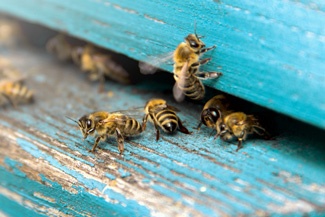Do bees understand zero?
 Beekeepers have been denouncing the neurotoxic products that threaten our bee populations for years, and for good reason. In addition to their crucial role in pollination, bees also make terrific subjects for animal cognition research. A team of Franco-Australian researchers recently studied these insects' understanding of the concept of zero. More broadly, they wanted to answer the question: are bees capable of mathematical abstraction?
Beekeepers have been denouncing the neurotoxic products that threaten our bee populations for years, and for good reason. In addition to their crucial role in pollination, bees also make terrific subjects for animal cognition research. A team of Franco-Australian researchers recently studied these insects' understanding of the concept of zero. More broadly, they wanted to answer the question: are bees capable of mathematical abstraction?According to the study’s authors, "zero" is a mathematical concept that's not easy to understand. They remind readers that it takes children several years to master. Indeed, the “void” isn’t naturally associated with a mathematical concept; it’s thus necessary to understand that this “nothing” represents a quantity in order to be able to assimilate it to a number with a defined symbol. In animals, research has shown that monkeys and birds are also capable of understanding “zero,” but no such evidence existed yet for insects. A recent study conducted by the Royal Institute of Technology at the University of Melbourne (Australia) and the CNRS Laboratory at the University of Toulouse III (France) has done just this.
Previous studies had shown that bees know how to count to five. In addition, as study co-author Aurore Avarguès-Weber reminds us, bees have very strong memory capacities and have developed two learning systems: one through experience (they remember their mistakes) and the other through interaction (they interact with each other to transmit knowledge via their famous dance). The animal cognition researcher says it’s relatively easy to get bees to perform mathematical exercises (with a culinary reward) because they are very playful animals.
In order to determine whether bees were capable of understanding “zero,” the scientists simply tested their ability to recognize “zero” as being smaller than “1.” Let’s see how this translates into the experimental design. First, the bees were trained to understand the notion of “less than” and “greater than.” To do so, the researchers developed an experimental design in which the bees had to make an analogical comparison: using two images (cards), the insects had to choose which contained the fewest elements (black dots). A correct response led to a sweet water reward. If the insects answered incorrectly, they were presented with a bitter quinine solution. Thus, the scientists taught the bees to compare two sets of numbers represented by dots.
Once the bees understood the rules of the "game," the researchers gave them the choice between an empty card and one with several dots. The bees chose the first option 80% of the time, proving that they understood that the “void” was smaller than 5, 4, 3, 2, and 1, and that they had assimilated the zero concept by assigning it a numerical value. Note that as the difference between the two cards increased, they made fewer mistakes. Scarlett Howard notes that: “When we showed them zero versus six, they did that at a much higher level than zero versus one. So that tells us is that they consider zero as an actual quantity along the number line. They're actually better at doing zero versus six because those two numbers are further apart.”
In conclusion, the fact that bees can understand the concept of zero with a brain of less than a million neurons (100,000 times fewer than humans) may have interesting applications for Artificial Intelligence engineers looking to design faster and more efficient machines.
Source: Scarlett R. Howard, Aurore Avarguès-Weber, Jair Garcia, Andrew Greentree, Adrian G. Dyer, “Bees extrapolate ordered relations to place numerosity zero on a numerical continuum”, in Science, June 2018







